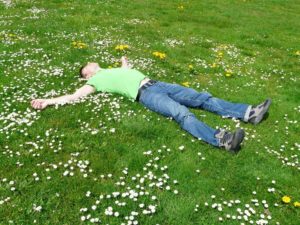We have a guest post on our blog today from Roxanne Turner. Roxanne is a Board Certified Life Coach with extensive training in ADHD and executive functioning, focusing on the process of getting things done.
Get off The Hamster Wheel
I was working with a client that was trying to figure out how he could get more work done instead of procrastinating and going down the YouTube & Facebook bunny trails. He finished each day feeling anxious and wrapped in guilt that he had not accomplished more. Sound familiar?
Maybe you or your student have been on the hamster wheel to nowhere and can’t figure out how to get off. After peeling back the onion, what we realized was that he wasn’t getting enough sleep. We had to focus on how to wind down his day to setup a good night sleep before thinking about strategies to get his work done.
You have probably seen some of the latest research regarding sleep deprivation and the effects on the brain. Just one night of poor sleep can affect cognitive ability, mood, coordination, attention, decision making, among others. Absent enough rest, the brain functions at a much slower rate and we have trouble concentrating, thinking clearly, and become more emotional.
Have you ever noticed when you don’t get enough sleep, just finding your keys in the morning can be a struggle? Maybe your sleep deprived kids seem pricklier and more defiant (this also applies to adults.)
Sleep Washes Away The Bad, Cycles in the Good
Sleeping provides the brain with an opportunity to do a “rinse cycle” and get rid of all the toxins that have accumulated throughout the day. When you go to sleep, the flow of cerebrospinal fluid increases significantly, washing away the harmful toxins and waste proteins that build up between the brain cells during waking hours. These toxins have been linked with Alzheimer’s disease.
Not only are you removing toxins, sleeping is also what enables your brain to consolidate and move information into long term memory. It is this process that then allows the brain to recall and use information to solve problems. One study showed that teenagers receiving just 18 extra minutes of sleep improved their grades in math and English. Even the great inventor Thomas Edison recognized the power of sleep to stimulate new thoughts and ideas. He would put ball bearings in his hand, doze off and when they fell to the ground and the noise woke him up he was able to come up with new approaches. (p. 30-31 a Mind for Numbers by Barbara Oakley, Ph.D.) This explains why our greatest ideas often come to us during our morning shower!
Turn Screen Time Into Sleep Time
What is it that prevents us from getting enough sleep? Unless you have sleep apnea or some other medical explanation, I’ve got one word for you – screens! Screens can include anything from browsing the internet, social media, video games, Netflix, and YouTube. The issue of endlessly pursuing electronic devices isn’t unique to our kids or millennials. It does not discriminate by gender, age, or ethnicity. I too have fallen into this trap that takes away from my ability to do my best the following day.
While staring at screens during the day can be detrimental to our productivity and connection with actual human beings, it’s at night that it sets us up for disaster when it comes to sleep. It is so easy to get sucked into staying up way past our bed time reading the news or catching up on facebook. The blue light emanating from our devices tricks your brain into thinking its daytime. This keeps it in a higher state of arousal and hyper focus similar to the effect of caffeine or even amphetamines. You might as well just drink a cup of coffee right before going to bed.
“So, am I ok if I just dial up the orange light on my device at night,” you might ask? It’s not just the blue light that causes problems. When you are watching or interacting with a screen, you are increasing the release of certain chemicals into the brain, like dopamine, and stimulating natural reward pathways that feeds the need for additional gratification. This is why it is so easy to say just 10 more minutes and then end up binge watching an entire season of Game of Thrones late into the night.
A Good Rule To Follow
In our household, there is a “no electronic devices in the bedroom” rule when it is time to go to bed for all of us. Before implementing this rule, I struggled, looking at work emails after climbing into bed, which kept my mind racing well after turning off the light. Now I pick up a book instead and I’m fast asleep in ten minutes. Our goal is screens off at least 30 minutes before bed. Are these evening habits always executed perfectly? Nope, we have good days and bad. But I do notice a huge difference in how the end of my day sets me up for the next. I feel better, am more inclined to work out, go for walks, and am more patient with my kids when they are being knuckleheads. Even they freely admit that they are wrecked the next day when they slip and sneak a peek at their devices before bed. Having one policy that applies to everyone reduces resistance and from the minions as we are modeling the behavior we expect from our kids. They love to point out any hypocrisy. In this case, it’s hard to argue.
So how are you going to close out your day? What is your evening routine? Is it worth finding a way as a family to get an extra 18 minutes of sleep?

